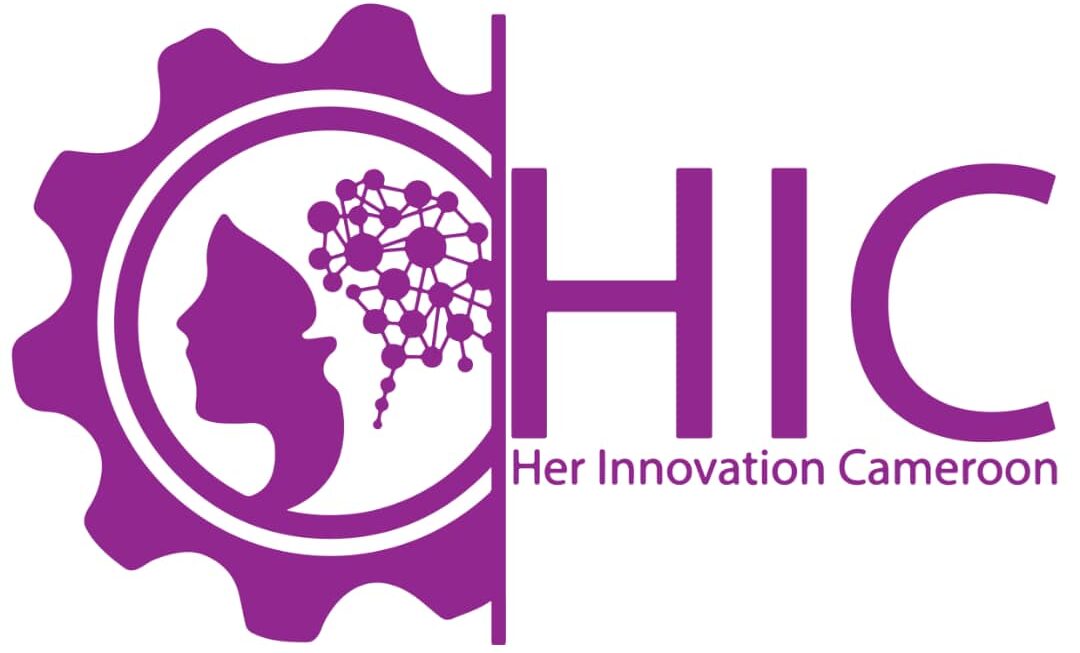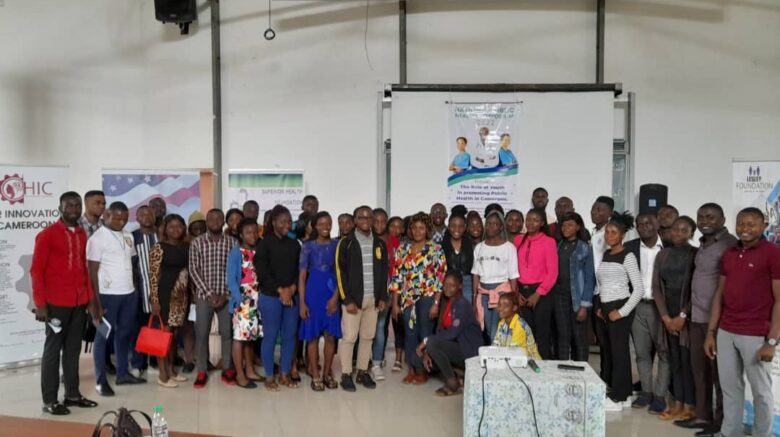Health they say is life and the bedrock of development. It is essential for every person to have access to good health care. Due to the ongoing crisis in the two Anglophone regions in Cameroon, most individuals in Cameroon have been victims of infectious diseases such as cholera, malaria and HIV/AIDS. In a bid to breach the gap of the health situation in Cameroon, Her Innovation Cameroon (HIC) with its partner; YALI Cameroon peace academy, Superior Health Foundation, Lesley Foundation, University of Buea American Corner and other partner organizations organised a two day workshop to help educate and sensitized the youths on the health challenges and the most appropriate ways to overcome the health challenges.
The work shop took place at the faculty of health science of the university of Buea at amphi 500 on the 7th and 8th of October 2022.on the theme “the role of youths in promoting public health in Cameroon”
On the first day of the symposium, the 7th of October 2022, the program started at 11 am with a word from an executive of one of the partner organizations; the president of Lesley foundation who welcome participants as well as introduce the various partners involve in the organization of the maiden event. He also went ahead to introduce the facilitators of the day and how the presentations and discussions will be done.
They were four presentations from the various four facilitators with each focused on their areas of specialties.
The first presentation of the day was done by Honourable Na Fotsigoho. In her presentation, she focus on the role of the legislature (parliament) in fostering the health rights of young people in Cameroon. She thus highlighted some legislations and stated that the youths who are the back born of society has a lot to do in the realization of the health rights and that of their peers and family through the sensitization and personal initiatives to educate themselves, peers and family on to ensure a healthy society. She concluded by calling on the youths to be ambassadors of peace in a way attend our health objectives given that the insecurity situation is one of the contributing factors for the deteriorating health situation in the region. There was a question and answer session to help participants better understand he subject matter.
The second presentation was done by Dr Ginyu Innocentia KwalarToh who presented on the Opportunities and challenges towards achieving universal health coverage in regards to youth sexual and reproductive health in Cameroon. In this regard, stated that according to a Report from the World Bank, People in developing countries pay over half a trillion dollars annually out-of-pocket for health services, which is pushing about 100 million people into extreme poverty each year. This suggest that we are yet to attain universal health coverage. He then presented some challenges towards achieving UHC. This includes
The penetration of financial services and mobile networks is too slow, The availability of medical resources and human talent in rural areas, Misinformation, myths and deeply ingrained cultural beliefs, Corruption and regressive practices, Regressive legislation hampering innovation, Too much capital is spent rebuilding yesterday’s health systems, Low government spending and an inability to collect sufficient tax revenues
.He further highlighted the need for Health care companies to give back to the communities and not only reward for profit as it will help boost the health situation. He also made it clear that the Solid PHC system in place and Technology which is a plus in solving the health crisis can only remedy the situation in the absence of the above challenges.
He then concluded by stating that, Sexual and reproductive health is critical to health and wellbeing across the life course, and therefore has to be embedded and integrated with health care, with universal access to all (WHO) and that since SRH is at the centre of UHC, we need to address the challenges and make use of the opportunities to attain universal health coverage.
The third presentation of the day was done by Robert Adamu Shey on the “Role of Academic Excellence in Public Health Promotion”. In his presentation, he ask three key questions which guided his presentation;
Does poor health during childhood or adolescence have any impact on educational achievement or performance?
Does the engagement of children and adolescents in unhealthy behaviours determine their academic performance and educational attainment?
Does academic performance have any impacts on public health – directly or indirectly?
In a bid to answer the questions and attained the objective of his presentation, he focus on the following; Global systems:
Economic system
Health system
Technological system
Social system
Political system
Educational system
The facilitator then emphasised the Functions of Academia in a PH System by stating that it; Educate and train public health workers; Conduct basic and applied research in disciplines pertinent to public health; Engage in community, public, and professional service
He stated that it is Important in that, Education is long-term investment – incentive to stay healthy and reap benefits of such – behavior, Helps individuals maintain or improve their health – enhanced knowledge of health issues, information availability, Educational achievement – higher earnings – translate into higher health expenditure – better health
He thus concluded with the Importance of research in health promotion which he stated was; Essential to health assessment, policy development, and others, Provides fresh insights, and creative solutions to health problems, Supplies the evidence base necessary for policy development
The forth presentation was done by Mr Emmanuel N Agbor who spoke on sickle cell. He focus on the causes and the ways to avoid it. To him, Sickle cell disease (SCD) is a genetic disorder caused by a mutation in the HBB gene. This gene provides instructions for the body to produce a part of hemoglobin. Hemoglobin is a protein that carries oxygen throughout the body.
He further provided that, If untreated for a prolonged period it may lead to; Stroke, Acute chest syndrome, a life threatening complication, Pulmonary hypertension or high blood pressure in lungs, Damage to several organs including kidneys, liver, and spleen due to reduced blood supply, Blindness, Sores or ulcers in the legs, Gallstones, Priapism or painful, long-lasting erections noted in men with sickle cell anemia and Osteoporosis
After the last presentation, there was a general question and answer session and at the end of it all group photos to end the day one of the symposium.
Day 2 of the symposium on 08/10/2022 started at 10am with a welcome address from the president of Lesley foundation who thank all participants for their commitment for the program. He further introduce the facilitators and the focus of discussion for the day. The participants were divided in to three groups with each facilitator assign to each.
The first group deliberated on cholera infection with focus the means of contamination, preventive measures and how youths can help prevent it in our communities given that they are the back born of every community.
The second group deliberated on the malaria disease with focus the signs and symptoms of malaria (high fever accompanied with chills, excessive sweating, pains in the joints and back, headache, vomiting and diarrhea, body weakness and lose of appetite), complication of malaria (untreated malaria can cause complications such as; breathing problems, failure of some organs of the body like kidney and liver), abstaining from mosquito bite that causes the illness through (sleeping under treated mosquito nets, reducing outdoor activities after sunset, wearing long sleeve cloth at night, applying insect repellants and ensuring that window and door are shut), how to get the treatment (where and from whom) and how youths can help prevent its prevalence in our communities given that they are the back born of every community.
The third group deliberated on the HIV/AIDS and specifically stigmatization of HIV patients. The focus the means of contamination, preventive measures, how to get the treatment (where and from whom) and how youths can help prevent the stigmatization of HIV patients in our communities. Some of the proposed ways of preventing stigmatization are; sensitization, peer to peer discussions, counseling and self-empowerment through acceptance.
After the group discussions, there was join presentation and a question and answer sessions to enlightened others with discussions of the other groups.
At the end of the symposium, all participants were call upon to be ambassadors of peace, unity, good health where ever the find them selves and to endeavor to share the information learnt with family, friends and peers.

